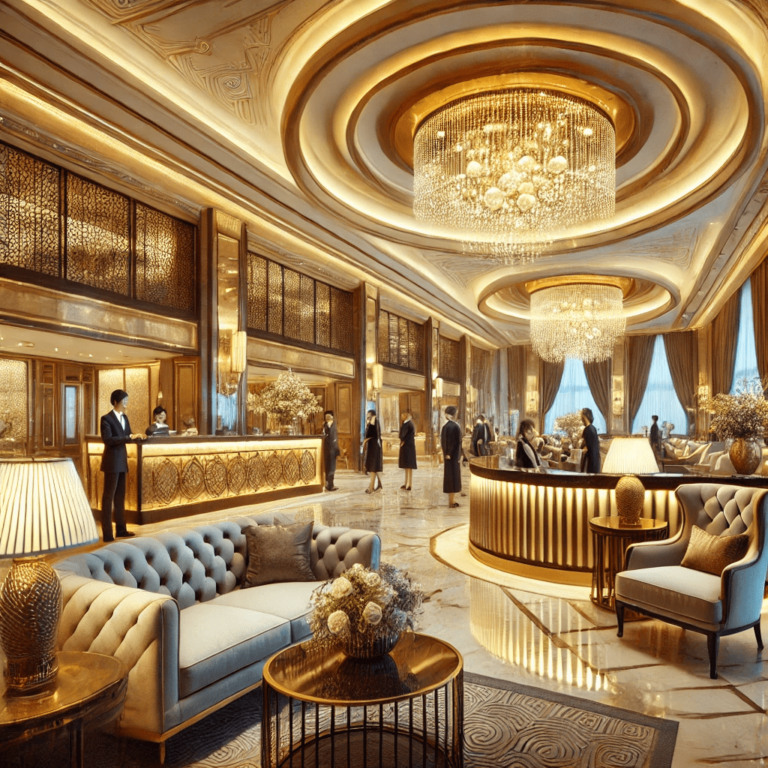Η πολυτελής φιλοξενία είναι ένας δυναμικός κλάδος που εξελίσσεται συνεχώς για να ανταποκρίνεται στις υψηλές προσδοκίες των εύπορων ταξιδιωτών. Από τις εξατομικευμένες εμπειρίες έως την απρόσκοπτη ενσωμάτωση της τεχνολογίας, τα πολυτελή ξενοδοχεία, τα θέρετρα και τα ιδιωτικά καταλύματα πρέπει να προσαρμόζονται για να παραμείνουν ανταγωνιστικά. Αυτό το άρθρο διερευνά τις τελευταίες τάσεις, τους βασικούς ρόλους εργασίας, τις στρατηγικές διαχείρισης, τις προκλήσεις και τις βέλτιστες πρακτικές στον τομέα της πολυτελούς φιλοξενίας. Επισημαίνουμε επίσης Deliverback, μια υπηρεσία αιχμής που ενισχύει την εμπειρία των πελατών και την αφοσίωση των επισκεπτών.
Αναδυόμενες τάσεις στην πολυτελή φιλοξενία
1. Εξατομίκευση και υπερ-προσαρμογή
Οι σύγχρονοι ταξιδιώτες πολυτελείας περιμένουν εξατομικευμένες εμπειρίες. Τα ξενοδοχεία χρησιμοποιούν προφίλ πελατών με βάση την τεχνητή νοημοσύνη για να θυμούνται προτιμήσεις όπως η θερμοκρασία δωματίου, ο τύπος μαξιλαριού και οι επιλογές φαγητού. Ορισμένες μάρκες προσφέρουν ακόμη και εξατομικευμένα δρομολόγια και υπηρεσίες με βάση το ιστορικό και τα ενδιαφέροντα των επισκεπτών.
2. Αειφορία και πρωτοβουλίες φιλικές προς το περιβάλλον
Οι ταξιδιώτες πολυτελείας έχουν όλο και μεγαλύτερη συνείδηση των περιβαλλοντικών τους επιπτώσεων. Τα ξενοδοχεία υψηλών προδιαγραφών ενσωματώνουν πράσινες κτιριακές πρακτικές, πολιτικές μηδενικών αποβλήτων και βιολογικά προϊόντα τοπικής προέλευσης. Η βιώσιμη πολυτέλεια αποτελεί πλέον βασικό σημείο πώλησης για πολλά ακίνητα πέντε αστέρων.
3. Έξυπνη τεχνολογία και ανέπαφες υπηρεσίες
Η τεχνολογία ενισχύει την ευκολία και την αποτελεσματικότητα. Έξυπνοι έλεγχοι δωματίων, θυρωροί με τεχνητή νοημοσύνη και ανέπαφο check-in/check-out γίνονται πρότυπα της βιομηχανίας. Τα ξενοδοχεία πολυτελείας επενδύουν σε υψηλής ταχύτητας διαδίκτυο, φωνητικούς ελέγχους δωματίων και προεπισκόπηση των καταλυμάτων σε εικονική πραγματικότητα.
4. Καταφύγια ευεξίας και ολιστικής θεραπείας
Η πολυτελής φιλοξενία περιλαμβάνει όλο και περισσότερο τουρισμός ευεξίας. Τα πολυτελή ξενοδοχεία διαθέτουν πλέον θεραπείες σπα, προγράμματα διαλογισμού, γεύματα εστιασμένα στη διατροφή και συμβουλές γυμναστικής προσαρμοσμένες στους στόχους υγείας των επισκεπτών.
5. Αποκλειστικές και ιδιωτικές εμπειρίες
Οι απαιτητικοί ταξιδιώτες αναζητούν μοναδικά, εμπειρίες που θα ζήσετε μια φορά στη ζωή σας. Τα ιδιωτικά νησιά, οι ναύλοι γιοτ και η πρόσβαση VIP σε εκδηλώσεις έχουν μεγάλη ζήτηση. Οι εξατομικευμένες υπηρεσίες μπάτλερ, οι ιδιωτικοί σεφ και οι επιμελημένες πολιτιστικές εκδρομές διακρίνουν τις πολυτελείς ιδιοκτησίες.
Βασικοί ρόλοι εργασίας στην πολυτελή φιλοξενία
Ο κλάδος της πολυτελούς φιλοξενίας προσφέρει ποικίλες ευκαιρίες σταδιοδρομίας. Μερικοί από τους πιο βασικούς ρόλους περιλαμβάνουν:
-
Γενικός Διευθυντής (GM): Επιβλέπει όλες τις λειτουργίες, εξασφαλίζοντας κορυφαίες εμπειρίες για τους επισκέπτες.
-
Διευθυντής Εμπειρίας Επισκεπτών: Επικεντρώνεται στις εξατομικευμένες υπηρεσίες και την ικανοποίηση των πελατών.
-
Θυρωρός: Οργανώνει αποκλειστικές δραστηριότητες, κρατήσεις και εξατομικευμένες συστάσεις.
-
Butler & Personal Attendant: Παρέχει υψηλού επιπέδου, διακριτικές και προσαρμοσμένες υπηρεσίες σε VIP επισκέπτες.
-
Εκτελεστικός σεφ: Σχεδιάζει γαστρονομικές εμπειρίες παγκόσμιας κλάσης χρησιμοποιώντας κορυφαία, τοπικά προμηθευόμενα συστατικά.
-
Διευθυντής Spa & Wellness: Διαχειρίζεται προγράμματα ευεξίας, συμπεριλαμβανομένων θεραπειών σπα και ολιστικών θεραπειών.
Αποτελεσματικές στρατηγικές διαχείρισης στην πολυτελή φιλοξενία
1. Βελτίωση του ταξιδιού των επισκεπτών
Από την άφιξη έως την αναχώρηση, κάθε αλληλεπίδραση πρέπει να είναι απρόσκοπτη. Τα ξενοδοχεία υψηλών προδιαγραφών χρησιμοποιούν συστήματα CRM (Customer Relationship Management) για να παρακολουθούν τις προτιμήσεις των πελατών και να διασφαλίζουν μια εξατομικευμένη εμπειρία σε κάθε στάδιο.
2. Εκπαίδευση και ανάπτυξη του προσωπικού
Οι εργαζόμενοι στον τομέα της πολυτελούς φιλοξενίας πρέπει να είναι ιδιαίτερα καταρτισμένοι στην εθιμοτυπία, την επικοινωνία και την επίλυση προβλημάτων. Επενδύοντας σε συνεχής εκπαίδευση διασφαλίζει ότι το προσωπικό παρέχει εξαιρετικές υπηρεσίες. Αυτό θα έχει ως αποτέλεσμα βελτίωση της αποδοτικότητας του ξενοδοχείου και θα βελτιώσει συνολικά την εμπειρία των επισκεπτών. Επιπλέον, υπάρχουν διάφορα συνέδρια, όπως το συνέδριο πολυτελούς φιλοξενίας που μπορεί να σας βοηθήσει να αποκτήσετε μια καλύτερη ιδέα για τις τάσεις και το μέλλον της πολυτελούς φιλοξενίας, τις στρατηγικές τμηματοποίησης που χρησιμοποιούνται στην αγορά της πολυτέλειας και την ψυχολογική προσέγγιση του κόσμου της πολυτέλειας.
3. Καινοτομία και προσαρμογή
Τα ξενοδοχεία πολυτελείας πρέπει να συμβαδίζουν με τις τάσεις του κλάδου και τις προσδοκίες των επισκεπτών. Η επένδυση σε πρωτοβουλίες τεχνητής νοημοσύνης, αυτοματοποίησης και βιωσιμότητας μπορεί να διαφοροποιήσει ένα ακίνητο από τους ανταγωνιστές.
4. Διαχείριση κρίσεων και μετριασμός κινδύνων
Από τις απειλές για την ασφάλεια στον κυβερνοχώρο έως τις παγκόσμιες πανδημίες, η διαχείριση των κινδύνων είναι ζωτικής σημασίας. Σχέδια έκτακτης ανάγκης, ασφάλιση και εκπαίδευση του προσωπικού βοηθούν τις πολυτελείς ιδιοκτησίες να αντιμετωπίσουν αποτελεσματικά τις απροσδόκητες προκλήσεις.
Προκλήσεις στην πολυτελή φιλοξενία
1. Υψηλές προσδοκίες επισκεπτών
Οι ταξιδιώτες πολυτελείας απαιτούν άψογη εξυπηρέτηση. Οποιαδήποτε αποτυχία στην εξυπηρέτηση μπορεί να επηρεάσει σημαντικά τη φήμη μιας μάρκας. Η εκπαίδευση του προσωπικού ώστε να προβλέπει τις ανάγκες των επισκεπτών είναι ζωτικής σημασίας.
2. Διατήρηση ειδικευμένων εργαζομένων
Ο κλάδος της πολυτελούς φιλοξενίας αντιμετωπίζει υψηλά ποσοστά κύκλου εργασιών. Ανταγωνιστικοί μισθοί, προγράμματα αναγνώρισης των εργαζομένων και ευκαιρίες επαγγελματικής εξέλιξης βοηθούν στη διατήρηση κορυφαίων ταλέντων.
3. Διατήρηση της αποκλειστικότητας
Οι μάρκες πολυτελείας πρέπει να εξισορροπούν την αποκλειστικότητα με την προσβασιμότητα. Η υπερβολική εμπορευματοποίηση μπορεί να μειώσει την ελκυστικότητα της μάρκας σε άτομα με μεγάλη περιουσία.
4. Αύξηση του λειτουργικού κόστους
Η παροχή κορυφαίων υπηρεσιών έχει υψηλό τίμημα. Ενεργειακά αποδοτικές λειτουργίες και στρατηγική διαχείριση του κόστους βοηθούν τα πολυτελή ξενοδοχεία να διατηρήσουν την κερδοφορία τους χωρίς συμβιβασμούς στην ποιότητα.
Βέλτιστες πρακτικές για εξαιρετική εξυπηρέτηση
1. Πρόβλεψη των αναγκών των επισκεπτών
Οι πολυτελείς υπηρεσίες είναι προληπτικές, όχι αντιδραστικές. Το προσωπικό πρέπει να προβλέψτε τις επιθυμίες των επισκεπτών με βάση προηγούμενες διαμονές και προσωπικές προτιμήσεις.
2. Απρόσκοπτη επικοινωνία
Τα ξενοδοχεία πρέπει να διασφαλίζουν γρήγορη και αποτελεσματική επικοινωνία μέσω εφαρμογών θυρωρού, υπηρεσιών ανταλλαγής μηνυμάτων και tablet στο δωμάτιο.
3. Αποκλειστικά προγράμματα επιβράβευσης
Εξατομικευμένα προγράμματα πιστότητας με VIP προνόμια και εξειδικευμένες εμπειρίες να ενθαρρύνει τις επαναλαμβανόμενες επισκέψεις από επισκέπτες υψηλού επιπέδου.
4. Ενσωμάτωση της πολυτέλειας με την ευκολία
Από τις ιδιωτικές μεταφορές μέχρι το εξατομικευμένο φαγητό, οι επισκέπτες εκτιμούν την αβίαστη πολυτέλεια. Ο εξορθολογισμός της εμπειρίας τους με κορυφαίες ανέσεις εξασφαλίζει την ικανοποίηση.
Deliverback: Ενίσχυση της εμπειρίας και της αφοσίωσης των πελατών
Τα χαμένα αντικείμενα μπορούν να επηρεάσουν σημαντικά την εμπειρία ενός επισκέπτη. Deliverback είναι μια υπηρεσία που εξασφαλίζει την απρόσκοπτη επιστροφή των απολεσθέντων αντικειμένων, ενισχύοντας την αφοσίωση και την ικανοποίηση των πελατών.
Πώς λειτουργεί το Deliverback:
-
Εάν ένας επισκέπτης αφήσει ένα αντικείμενο πίσω του, το ξενοδοχείο χρησιμοποιεί Η πλατφόρμα της Deliverback να τους ειδοποιήσει.
-
Οι επισκέπτες μπορούν να επιλέξουν το προτιμώμενο μέθοδος αποστολής και προορισμός.
-
Η διαδικασία είναι χωρίς προβλήματα, αυτοματοποιημένη και ενισχύει την εμπιστοσύνη των επισκεπτών.
Με την ενσωμάτωση του Deliverback, τα πολυτελή ξενοδοχεία δείχνουν προσοχή στη λεπτομέρεια και να επιδεικνύουν ανώτερη φροντίδα των πελατών, αυξάνοντας τις θετικές κριτικές και τις μακροχρόνιες σχέσεις με τους επισκέπτες.
Συμπέρασμα
Η πολυτελής φιλοξενία αναπτύσσεται με την αριστεία, την καινοτομία και την εξατομίκευση. Προσαρμογή σε βιωσιμότητα, τεχνολογία και εξελισσόμενες προσδοκίες των επισκεπτών εξασφαλίζει συνεχή επιτυχία σε αυτόν τον ανταγωνιστικό κλάδο. Εστιάζοντας σε εξαιρετικές υπηρεσίες και αξιοποιώντας λύσεις όπως η Deliverback, τα πολυτελή ξενοδοχεία μπορούν να υπερβούν τις προσδοκίες των πελατών, να χτίσουν αφοσίωση και να ξεχωρίσουν στο διαρκώς εξελισσόμενο τοπίο της φιλοξενίας.


